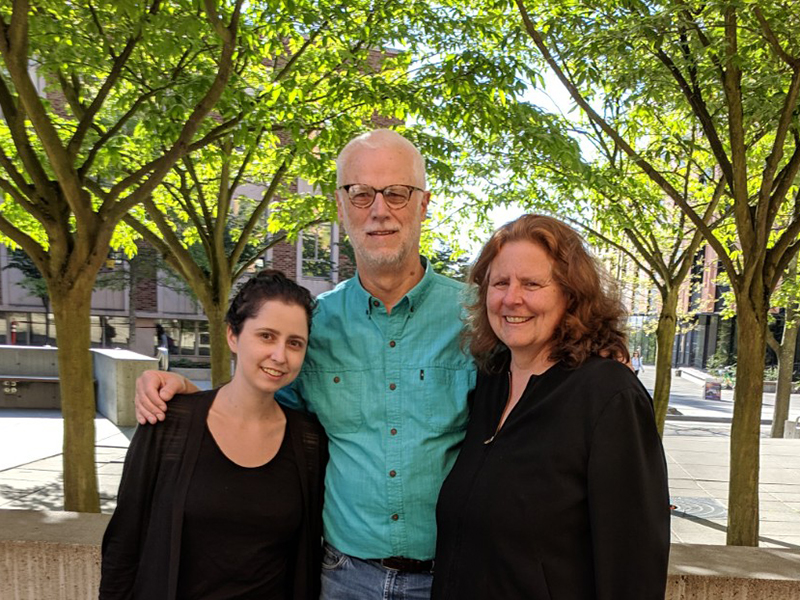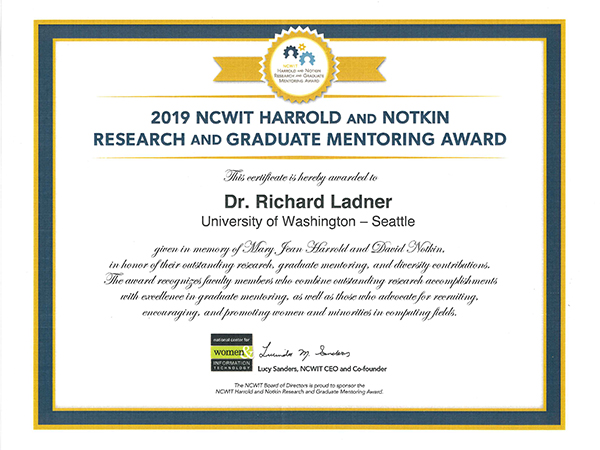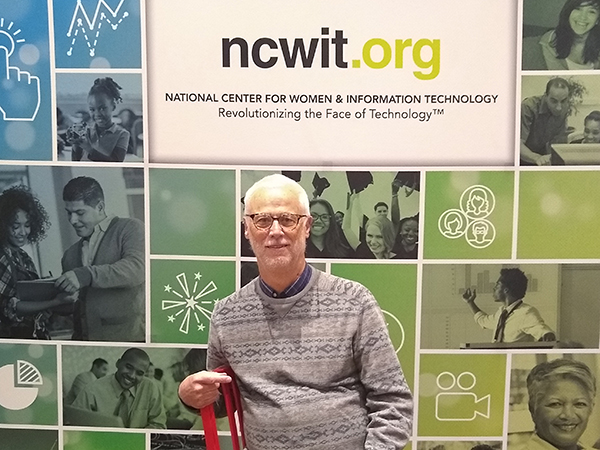
Richard Ladner, professor emeritus of the Allen School and a recognized leader in accessible technology research and advocacy, accepted the Harrold and Notkin Research and Graduate Mentoring Award this week from the National Center for Women & Information Technology (NCWIT). The award, which recognizes faculty who combine outstanding research contributions with excellence in mentoring the next generation of researchers while promoting diversity in the field, is named in memory of the late Georgia Tech professor Mary Jean Harrold and Allen School professor David Notkin, who served as chair of what was then the University of Washington Department of Computer Science & Engineering from 2001 to 2006. Both Harrold and Notkin passed away after battles with cancer in 2013.
“Mary Jean and David were guiding lights when it comes to prioritizing student mentorship and diversity alongside technical excellence,” Ladner said. “The connection between this award and my good friend and colleague makes this recognition particularly meaningful. It is humbling to be recognized in this way by my peers in the computing community.”
Of the 30 students Ladner has advised or co-advised on their way to earning their Ph.D., 43 percent are women. One of those former students, Cornell Tech professor Shiri Azenkot (Ph.D., ‘14), credits Ladner with providing a supportive environment for people of all genders. “I would look forward to our research group meetings, in which all the students (Ph.D. and undergraduate) and collaborating faculty members would come together to discuss their current research,” Azenkot told NCWIT. “Our group included at least 80 percent women (sometimes more), and our meetings offered a relaxed and friendly place to discuss research and other activities.”

A strong proponent of gender diversity throughout his career, Ladner has also made it his mission to ensure that ensuring access for people with disabilities is part of every conversation about diversity and inclusion in the computing field. While he devoted the first three decades of his faculty career to theoretical computer science — and made fundamental contributions to complexity theory, parallel computing, and more during that time — Ladner came to the realization that accessibility, not just algorithms, was one of his true passions as both a researcher and a leader. His shift in focus played a significant role in UW’s emergence as a center of accessible technology education and research, and helped expand how his own field thinks about diversity.
“Part of my job as an accessibility researcher is to change people’s mindset about disability,” Ladner explained in a 2017 article looking back on his career. “It presents challenges, yes, but it’s not necessarily a tragedy. It is part of the diversity of life. Our role as researchers and technologists is to embrace this diversity and make sure we reflect that in our work.”
Ladner’s commitment to mentorship has extended to the undergraduate level, where he has advised more than 100 students engaged in research. As his Allen School colleague, Ed Lazowska, attests, that commitment has extended beyond his own program, as Ladner often has tapped into his vast network of colleagues and friends to offer students outside the UW a path into research. “Richard has personally helped place 50 students with disabilities in undergraduate research internships around the nation since 2011,” Lazowska noted. “In the placement process, he phoned each student to try to understand their scholarly interests and abilities, to help find a suitable mentor the student’s summer research experience.”
Ladner has also championed a number of initiatives to engage more students with disabilities in computer science education and careers, including breaking down barriers at the K-12 level. Earlier this year, Code.org and the Computer Science Teachers Association named Ladner a Computer Science Champion in recognition of his work on AccessCSForAll, an initiative that provides curriculum and professional development tools to help teachers in making computer science accessible to students with disabilities in their high school classrooms. AccessCSForAll was an outgrowth of his leadership of AccessComputing, a program Ladner co-founded with frequent collaborator Sheryl Burgstahler, Director of the UW’s Do-IT Center, to increase the participation of people with disabilities in postsecondary computing education and careers by offering resources, mentoring, funding, and networking opportunities. Previously, Ladner led the Summer Academy for Advancing Deaf and Hard of Hearing in Computing, which provided deaf and hard of hearing students from around the country the opportunity to take computing courses for credit and connect with industry professionals who were themselves deaf or hard of hearing.
Ladner collected the Harrold and Notkin Award at NCWIT’s 2019 Summit on Women and IT that took place this week in Nashville, Tennessee. The award is the latest in an impressive list of accolades honoring his leadership in accessibility education, research, and advocacy, including the Richard A. Tapia Achievement Award, the Strache Leadership Award, the SIGACCESS Award for Outstanding Contributions to Computing and Accessibility, the SIGCHI Social Impact Award, the Broadening Participation in Computing Community Award, the Computing Research Association’s A. Nico Habermann Award, and the Presidential Award for Excellence in Science, Mathematics & Engineering Mentoring.
Read the NCWIT announcement here, and learn more about the Harrold and Notkin Award here.
Congratulations, Richard!


